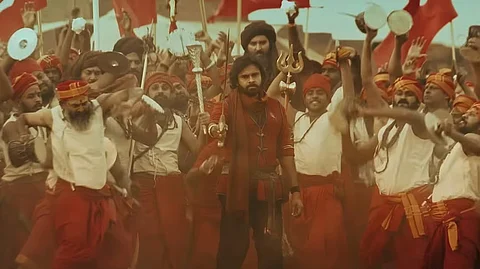

Follow TNM's WhatsApp channel for news updates and story links.
Hari Hara Veera Mallu Part 1: Sword Vs Spirit (Telugu)
As Veera (Pawan Kalyan) gallops across the Deccan towards Delhi to steal the Kohinoor from Aurangzeb (Bobby Deol), his fellow travellers from the Golconda Sultanate are awed by his superhuman abilities to telepathise with animals and thwart dangers. “Who are you, really? You’re clearly not who you say you are,” one of them asks. Before Veera spills his backstory, fans in the theatre started to scream “Power Star Pawan Kalyan”.
That big film stars aren’t removed from their real-life personas on screen is a given. The interplay isn’t meant to be subtle, certainly not in Pawan Kalyan’s case when his political speeches and movie dialogues have been overlapping more and more lately.
His new film, Hari Hara Veera Mallu Part 1: Sword Vs Spirit, is a period action drama that’s been five years in the making. In these five years, Pawan Kalyan has skipped over the political spectrum from left to right, won his first election, became the Deputy Chief Minister of Andhra Pradesh, and fashioned himself into an aggressive protector of Sanatana Dharma. Director Krish Jagarlamudi, who has worked on the NTR biopics and Kangana Ranaut’s Manikarnika: The Queen of Jhansi, left the project midway, with AM Jyothi Krishna – and partly Pawan Kalyan himself – taking over.
The result is a half-hearted, disordered mess of a historical propaganda film.
The baby Veera Mallu floats along a river into an agrahara, exactly when the diamond miners of Kollur along the Krishna river bank pray for a saviour to free them from the tyranny of the local feudal lords. These landlords work for the Qutb Shahis, who work for the Mughals, identified as the source of all the oppression they are subjected to. Veera has no birth origin story, and therefore, no caste or religion. He is, however, raised to take on the mantle of protecting Hindus from Aurangzeb.
Veera is a skilled thief who catches the attention of the Qutb Shahis for his flair for stealing diamonds mined in Kollur, which he uses to fund either workers’ welfare or Hindu temples. He is hired to steal the famous Kohinoor, often equated to the ‘syamantaka mani’ from Hindu mythology, from the Mughals’ peacock throne.
It’s no surprise that the film, set in the 17th century, plays fast and loose with historical facts. Pop history ideas around the jizya tax imposed on non-Muslims and Aurangzeb’s ban on music are dramatised, in spite of shaky, contradictory evidence.
In an action sequence set around the Charminar, Pawan Kalyan is seen praying to a Hindu stone idol under the monument, a clear suggestion to the Bhagyalakshmi temple which the Bharatiya Janata Party (BJP) has been using as a political tool, despite evidence that it’s an unauthorised structure built only after 1948.
But Hari Hara Veera Mallu also doesn’t entirely adopt the bloodthirsty tropes of contemporary communal films. Along with Bobby Deol’s vicious, anti-Hindu ruler in Aurangzeb, there are many token ‘good Muslims’ who are also victims of his tyranny, while a Hindu feudal lord is also shown to be exploitative.
Faint outlines of what might have been the action drama originally conceived come through at times, especially in the beginning. But nothing solidifies.
Nidhhi Agerwal ineptly plays Panchami, a woman who needs Veera to rescue her from a cruel feudal lord. But whether it’s Panchami, Veera’s foster parents (Easwari Rao and Sathyaraj), a crew of petty criminals working with Veera (Sunil, Subbaraju, Nassar), or the other characters played by renowned actors (Sachin Khedekar, Tanikella Bharani, Kota Srinivasa Rao, etc.) flitting across the screen, none of them quite transcend one dimension.
Pawan Kalyan calls himself a “reluctant actor” who’s only acting in movies to make money for his family and his party. The reluctance is glaring in Hari Hara Veera Mallu, even beyond the lead actor’s work.
The film barely seems to care for its own ‘battle for Dharma’. There are endless recalls to Baahubali and RRR, as if the audience is expected to feel roused with the mere suggestion of impactful scenes, no matter how shoddily written and filmed.
Beyond its obvious politics, there’s nothing imaginative about the film, as if the audience are expected to fill in the glaring gaps of emotional heft and artistry with their knowledge of the overt political, communal context.
When Veera is rescued as a baby, his foster mother declares that he will grow up to be a ‘sainikudu’, ‘jana sevakudu’. As he grows up into ‘Janasenani’ Pawan Kalyan, the film wants to suggest that he is practically an incarnation of the goddess Ammavaru. But Hari Hara Veera Mallu is too crude and flimsy a film to carry such majestic ideas, whether historical, fictional or political.
Disclaimer: This review was not paid for or commissioned by anyone associated with the film. Neither TNM nor any of its reviewers have any sort of business relationship with the film’s producers or any other members of its cast and crew.